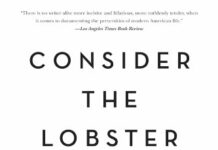
Ebook Info
- Published: 2010
- Number of pages: 263 pages
- Format: PDF
- File Size: 1.51 MB
- Authors: David Foster Wallace
Description
The Pulitzer Prize finalist and author of The Pale King and Infinite Jest weighs in on a philosophical controversy in this fascinating early work. In 1962, the philosopher Richard Taylor used six commonly accepted presuppositions to imply that human beings have no control over the future. David Foster Wallace not only took issue with Taylor’s method, which, according to him, scrambled the relations of logic, language, and the physical world, but also detected a semantic trick at the heart of Taylor’s argument.Fate, Time, and Language presents Wallace’s brilliant critique of Taylor’s work. Written long before the publication of his fiction and essays, Wallace’s thesis reveals his great skepticism of abstract thinking and any school of thought that abandons “the very old traditional human verities that have to do with spirituality and emotion and community.” As Wallace rises to meet the challenge to free will presented by Taylor, we witness the developing perspective of this major novelist, along with his struggle to establish solid logical ground for his convictions. This volume, edited by Steven M. Cahn and Maureen Eckert, reproduces Taylor’s original article and other works on fatalism cited by Wallace. James Ryerson’s introduction connects Wallace’s early philosophical work to the themes and explorations of his later fiction, and Jay Garfield supplies a critical biographical epilogue.
User’s Reviews
Reviews from Amazon users which were colected at the time this book was published on the website:
⭐David Foster Wallace (DFW) was a certified “genius” (a MacArthur grant recipient) who became famous as “one of the most talented fiction writers of his generation” in the words of philosopher Jay Garfield. Garfield contributes an appreciation of DFW in the posthumous book; Fate, Time, and Language. Garfield thought that DFW missed his calling. Instead of becoming a novelist, famous for manic novels like Infinite Jest and The Pale King, Garfield suggests that he could have been an even better philosopher. Garfield says that DFW’s essay contained in Fate, Time, and Language; `Richard Taylor’s “Fatalism” and the Semantics of Physical Modality’; which was one of DFW’s senior theses at Amherst, proves that “. . . had he lived, he would have been a major figure in our field.” The other senior thesis became The Broom of the System, which started DFW onto his career in literary fiction in 1985.DFW’s philosophy thesis is directed against the modern philosopher Richard Taylor, whose article `Fatalism’ (The Philosophical Review, Vol. 71, No. 1, 1962) made the claim that six “presuppositions”, commonly accepted by modern day philosophers, lead to the conclusion that fatalism is true. The presuppositions:1) Any proposition whatever is either true or, if not true, false.2) If any state of affairs is sufficient for, though logically unrelated to, the occurrence of some further condition at the same or any other time, then the former cannot occur without the latter occurring.3) If the occurrence of any condition is necessary for, but logically unrelated to, the occurrence of some other condition at the same or any other time, then the latter cannot occur without the former occurring also.4) If one condition or set of conditions is sufficient for another, then that other is necessary for it and conversely, if one condition or set of conditions is necessary for another, then that other is sufficient for it.5) No agent can perform any given act lacking some precondition for it.6) Time does not enhance or decrease an agent’s powers.Taylor’s other writings (including the article “The Problem of Future Contingents” included in Fate, Time, and Language) make clear that Taylor didn’t think that fatalism was true. Like Aristotle (and Lukasiewicz) he thought that proposition 1) above, a paraphrase of the Principle of Bivalence (PB), didn’t apply to future contingent events.DFW takes a different approach: to demolish Taylor’s fatalism argument in support of an overall conclusion that “if Taylor and the fatalists want to force upon us a metaphysical conclusion, they must do metaphysics, not semantics.” How we get there is a longish story, all of which I won’t tell here, but the story follows a path through Aristotle, Lukasiewicz, and Hobbes to contemporary commentators on Taylor’s paper and finally to invention of a system to evaluate physical modalities based on the possible worlds modal logic of Kripke modified by Montague to include time. DFW calls this “System J”, presumably in honor of his thesis adviser, the above-mentioned Jay Garfield.Fate, Time, and Language is about fatalism. Fatalism comes up in a very old argument in the never-never land between logic and metaphysics, Aristotle’s argument about the problem of future contingents: “For example, a sea-fight must either take place on the morrow or not. No necessity is there, however, that it should come to pass or should not. What is necessary is that it either should happen tomorrow or not.” (On Interpretation, IX, 19a, 29, Loeb translation by Harold P. Cooke). In Aristotle’s analysis of the problem, he appears to conclude that contingent future events are an exception to the normal rule that has come to be known as Principle of Bivalence (PB): “In regard to things present or past, propositions, whether positive or negative, are true of necessity or false.” (On Interpretation, IX, 18a, 28). He is led to that conclusion by an argument that finds that that if we assume PB for the case of future contingent events then fatalism is proved, a conclusion which Aristotle finds absurd (…).PB is a crucial concept here, since Aristotle’s argument was not that fatalism is true, but that since it is obviously false, there seem to be some “things” (propositions, statements, or sentences) which are neither true nor false, thus contradicting PB. DFW goes to some pains to point out the difference between PB and the Law of Excluded Middle (LEM). He refers to Susan Haack in Deviant Logic (p 65): “I shall approach the question . . . by investigating . . . three principles: the principle of bivalence, the principle that every wff (well-formed formula) is either true or false (hereafter PB); the law of excluded middle, the wff `p or not p’ (hereafter , LEM); and Tarski’s material adequacy condition for the definitions of truth, the principle that `A’ is true iff (if and only if) A (hereafter, (T)).” (T) is not in scope here. But PB and LEM are at the heart of the issue that Aristotle and Taylor tried to address.Wallace complains that Taylor commits an “equivocation” between two sorts of non-logical, physical implications: 1) “necessary-of” and 2) “necessary-for” implications. “I give Order -> Sea-battle tomorrow” is a “necessary-of” implication. “Combustion -> Presence of fuel” is of the other variety. “Battle B is a necessary consequence of order O. But would we want to say with regard to 2) that the presence of fuel is a necessary consequence of combustion?” Why is this important? Because, according to DFW, 1) and 2) can be shown to “behave differently under a modus tollens operation (a deny-the-consequent-and-see-what-happens-to-the-antecedent operation.” Wallace follows the criticism of Charles Brown’s “Fallacies in Taylor’s Fatalism” (reprinted in Fate, Time, and Language) that Taylor’s propositions 2, 3, 4 and 5 are invalidated by this “equivocation.” But, importantly, not (like Aristotle, Lukasiewicz, and Taylor) proposition 1, PB.But we are still a long ways from Wallace’s final argument here. In the course of this argument he shifts from the sea battle of Aristotle to a nuclear explosion on the Amherst campus. (See the manic mind at work here?) “Suppose that the day before yesterday a group of terrorists brought a completely assembled and fully functional nuclear weapon onto the Amherst College campus. Suppose further that yesterday the head terrorist, completely healthy and physically functional and not constrained in any way, sat next to the weapon, with his finger on the weapon’s fully functional triggering mechanism, all day, but did not press the trigger and so did not cause a nuclear explosion to occur, and so a nuclear explosion did not in fact occur on campus yesterday. Suppose further, since we’re trying to be as Taylor-ish as possible, that a nuclear explosion on the Amherst campus yesterday would be an occurrence causally, physically sufficient for the presence of radiation in excess of, say 20 rads on the Amherst campus today.”But there is no radiation today. This is the condition (R>20) that in Taylor’s sense is “necessary for” the occurrence of the explosion yesterday. But, Wallace insists, that rather R>20 is a “necessary consequence of” an explosion yesterday. Does this matter? Wallace thinks yes. “What it means in a nutshell is that the denial of the consequent’s obtaining today means only that it cannot today be the case that yesterday the explosion did occur, not that it was the case yesterday that the explosion could not occur.”Wallace says, “. . . we have granted everything that Taylor would seem to want us to grant. But we are still able to reasonably deny the fatalistic conclusion. This is because we can point out that in the absence of radiation today we evaluate P1E’s (“E” at some past time) possibility relative to what occurs now, today, at a time later than that designated by P1. We can say that this allows us to conclude only that, given what obtains today, it is not possible that P1E. Were we, however, to say something different, that at P1 it was not possible for E to occur, we would be evaluating the possibility of E at and relative to P1, not at or with respect to any other time, viz., now. But it is this second sort of conclusion that Taylor seems to want us to derive from everything we have been willing to grant to him thus far. It means basically that we would be saying that, given the set of circumstances that obtained yesterday, E was not physically possible yesterday. We would be saying not that it is not now possible that E occurred at P1, but rather that at P1 it was not possible for E to occur. And this would have as a consequence our buying the following: that yesterday, during the whole time the healthy and efficacious terrorist sat unconstrained with his limber finger on the fully functional triggering device of the fully operational nuclear weapon, it was somehow physically impossible for the explosion to occur. And this is clearly wrong . . . . “Are we done yet? Not by a long shot. We haven’t even gotten to `System J’ yet. And we are not going to go there. The interested reader will need to consult the book, for `System J’ involves typography and “math logic” not available to the current author. Suffice it to say that one of the virtues of this approach in Wallace’s mind is that it can be used to invalidate not just Taylor’s argument about future contingent events, but his further argument about past events as well.I have already quoted Wallace’s ultimate conclusion: that we cannot derive metaphysical conclusions by semantics. But this is perhaps the place to mention the conclusions of Lukasiewicz in an article contained in the book Polish Logic 1920 – 1939, edited by Storrs McCall. This book is referenced in Wallace’s thesis, but for the famous article on “Many-valued systems of Propositional Logic.” The article that I want to mention is the article “On Determinism” that precedes the article quoted in Wallace’s thesis. For in this article Lukasiewicz addresses the same issue as Wallace and comes to the same conclusion as Taylor in his subsequent work: that the principle of bivalence “cannot be proved. One can only believe it, and he alone who considers it self-evident believes it. To me, personally, the principle of bivalence does not appear to be self-evident. Therefore, I am entitled not to recognize it, and to accept the view that besides truth and falsehood there exist other truth-values, including at least one more, the third truth-value. . . . I maintain that there are propositions which are neither true nor false but indeterminate.” My own preference would be to extend the courtesy also to propositions that are both true and false; not all propositions, of course, but only those that lie on the margins of thought, iteration, and language.
⭐This book centers around David Foster Wallace’s undergraduate honors thesis in philosophy. It begins with a very well-written and interesting introduction to the philosophical argument DFW takes to task in his thesis, an argument by Taylor that takes a set of commonly accepted philosophical presuppositions and entails fatalism. The book then presents Taylor’s article, originally published in the early 1960s, and a flurry of (sometimes heated) responses by other philosophers. All of this serves as the background for Wallace’s work, which extends (seemingly substantially) upon those other responses.I’m not a philosopher by either trade or background, and so I won’t claim to have followed every nuance of all of the arguments, and as a reader, I found the back-and-forth regarding Taylor’s original argument less interesting than either the introduction or DFW’s contribution. However, the thesis itself is lucid (and I think easier to follow than several of the other arguments, even if it is not particularly light reading), and in a word, satisfying. It seems to me that David Foster Wallace was an exceptionally gifted person, and so I am glad that the editors and contributors put forth the effort to make it available. It was also enjoyable to detect elements of his literary style even at this early stage of his writing.Based on this book alone, I’m not convinced that David Foster Wallace found the question of free will (as the subtitle might suggest) all that vexing or in need of defense – it seems as likely that he was concerned about the imprecise use of language and the confusion it may lead to – that doesn’t detract from the book in any way. Very enjoyable for fans of DFW or, say, modal semantics.
⭐I’m a DFW fan and also a philosophy nerd, so I may be biased here, but this was a real page turner for me. I strongly suspect that people who are not into analytic philosophy will find it dry and perhaps even unreadable – certainly it’s not as romantic as the title might lead you to believe. However, since it is reconstructing DFW’s thesis writing process there is a slight biographical quality to it that should be accessible enough to everyone. I also think there can be a romantic point to it, but this isn’t like some friends casually discussing free will and fate, it’s a serious analytical argument using varieties of formal logic that will be alien to most people.The thesis is a refutation of Richard Taylor’s brand of fatalism. Specifically, it refutes the idea that fatalism is purely logical and not requiring any metaphysical assumptions. This is connected to Wittgenstein’s assertion that the concept of “free will” is perhaps just a reflection of the fact that the future isn’t a logical consequence of the past. This is counterintuitive to many people who believe in what Wittgenstein’s calls “the causal nexus”, which he eschewed as metaphysics.In any event, DFW draws from the best technical logical experts he can find to create a very compelling argument in favor of his thesis. The thesis may be too technical for the average reader (or for that matter philosophers not acquainted with modal logic) and feels a bit like overkill, but as they say “technically correct is the best kind of correct”. DFW, notorious for pulling out all the stops in his writing, also apparently pulled out all the stops in his philosophy thesis.
⭐If, like me, you were a philosophy major who was never informed that someone named “David Foster Wallace” had presented an ingenious solution to the paradox of “fatalism” — let alone that there even was a “paradox of fatalism” — don’t get too excited just yet. Especially don’t get too excited just yet if you envision profound insights into the mysteries of causation and/or determinism vs predeterminism. His is a dry, formal, solution to a purely semantic problem which isn’t even a paradox. In fact, it isn’t even a semantic problem, as far as I can tell. Of course, I didn’t actually read either Wallace’s solution, or the (apparently famous) essay by Richard Taylor which introduced the paradox, so I don’t, strictly speaking, have the resources to provide a comprehensive critique of his solution to the paradox. But in my own defense, I must point out that it is consistent with my warning not to get too excited about this book. And I did read, and even learn something from, the introduction. I learned that David Foster Wallace was also a philosophy major, who dedicated his senior thesis to solving the “fatalism” paradox introduced by Richard Taylor, before becoming bored and disillusioned with philosophy, and abandoning his academic career to write novels. I think this is a real shame. Not because I am averse to Wallace’s novels — I haven’t read them either — but because philosophy is a really exciting subject, and the “paradox of fatalism” is not. What is the paradox of fatalism? Not having read the book, I am hardly in a position to provide an explication, But I can say with absolute certainty that it isn’t a fun paradox, like the ones that Zeno entertained and amazed everyone with. The paradox of fatalism, it seems, stems from this premise, which Richard Taylor claims that everyone can agree is true: “Every statement is either true or false.” There are a bunch of other premises, of course, but I didn’t read them either — not because they were equally un-fun, although presumably they were, but because I don’t agree that this premise is true. Indeed, it seems to me to be so blatantly false that it would not be worth discussing even if it were fun, and it is (most emphatically) not fun. From a logical point of view, it seems to me that the premise should be phrased not “Every statement is either true, or false,” but “Every statement is either true, or not-true.” Under the rubric of “not-true” might be infinitely many sorts of meaningful statements — some with probability values bordering on certainty, others completely absurd, and still others which do not admit of truth values at all. So what is the problem? As presented in this book, the problem has something to do with statements about the future, the epistemological status of which, if you accept the premise, “Every statement is either true or false” — which is not, again, a reasonable premise to accept — leads to fatalism, or the doctrine that we have no control over our actions. Wallace’s project, apparently, is a formidable, mathematics-based, linguistics attempt to defeat this paradox. My solution is to reject the initial premise as false outright, and, instead of reading a formidable, mathematics-based solution to the (purely semantic) problem of accepting the statement “Every statement is either true or false,” just take my word for it that it’s false, and read an exciting, non-linguistics-based book about causation and predeterminism instead. If you don’t want to take my word for it, consider this statement: “‘Fate, Time, and Language'” is a great title, but a great big bore of a book.” Now there’s a meaningful statement which is neither true nor false; it is simply my opinion. But if you, like me, have fond memories of your philosophy studies, and were never introduced to the paradox of fatalism, then this would help explain why.
⭐the meaning of free will have never been understood, at large, in our world. David is having some rough time with it, but that’s s good start.
Keywords
Free Download Fate, Time, and Language: An Essay on Free Will in PDF format
Fate, Time, and Language: An Essay on Free Will PDF Free Download
Download Fate, Time, and Language: An Essay on Free Will 2010 PDF Free
Fate, Time, and Language: An Essay on Free Will 2010 PDF Free Download
Download Fate, Time, and Language: An Essay on Free Will PDF
Free Download Ebook Fate, Time, and Language: An Essay on Free Will





